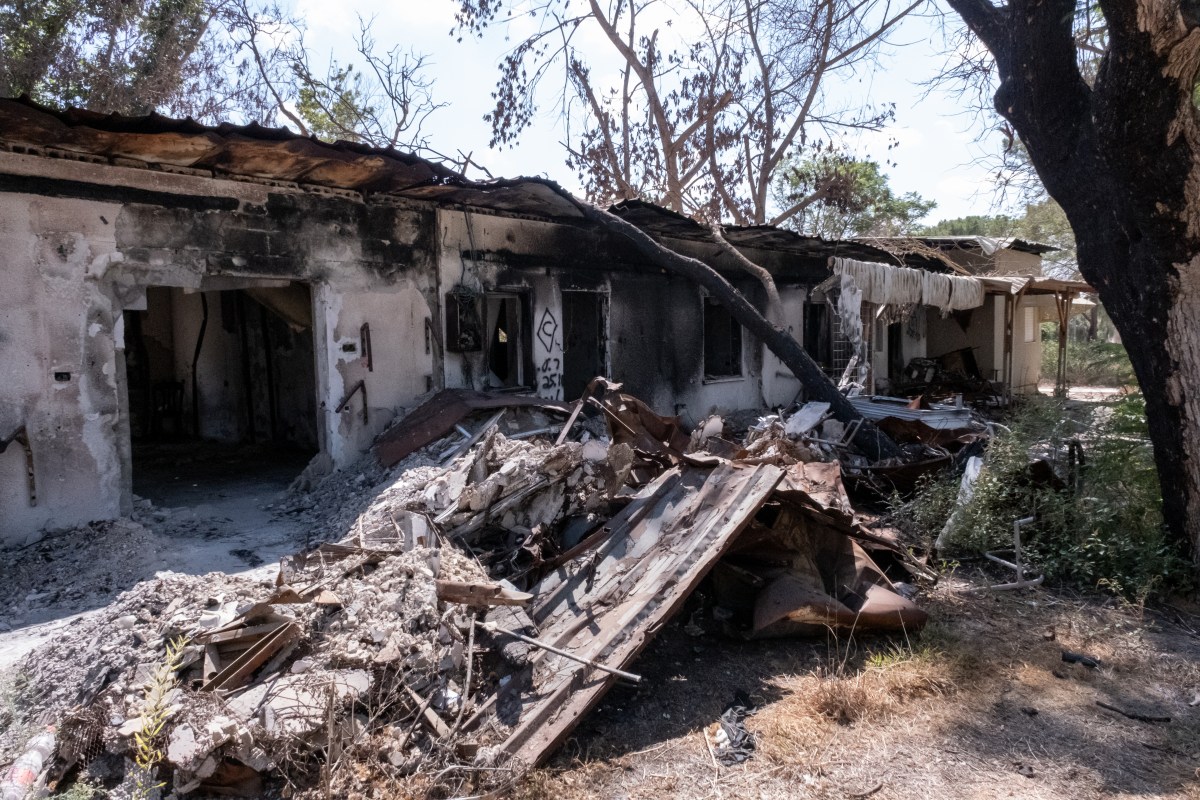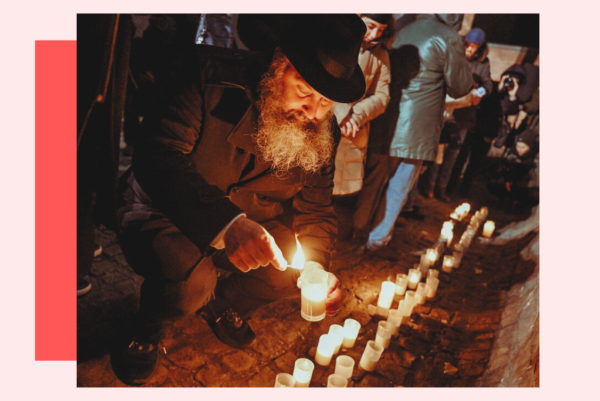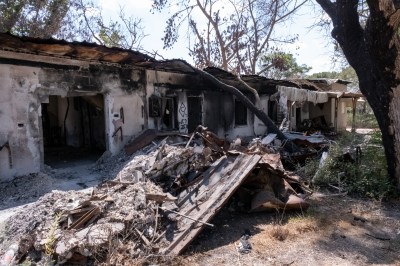Happy Monday. It’s been a bleak week—with tragic scenes out of Appalachia, where the recovery is only just beginning after Hurricane Helene swept through—and it’s a grim day, as we remember the victims of Hamas’ brutal October 7 attack one year ago today.
Amid the darkness, we were uplifted by this beautiful rendition of “Amazing Grace” played Saturday by the combined marching bands of rivals North Carolina State and Wake Forest universities as a tribute to their fellow North Carolinians whose homes were devastated by flooding.
Quick Hits: Today’s Top Stories
- The Israel Defense Forces (IDF) struck a mosque and school in an airstrike in the northern Gaza Strip on Sunday morning, saying terrorists were using it as a “command and control complex.” According to the Hamas-run Gaza Health Ministry, the Israeli airstrike killed 26 people and injured 93 others—though it did not distinguish between civilian and terrorist casualties. The IDF confirmed the airstrike on Sunday—acknowledging the targeted area was “previously used” as a school—and said the IDF took “many steps” to reduce harm to the civilian population, including the use of precision weaponry. “The terrorist organization Hamas systematically violates international law, brutally exploiting civilian institutions and the population as human shields for terrorist acts,” an IDF spokesperson added.
- Meanwhile, Israel’s air force struck targets in Beirut and in the Lebanese capital’s surrounding suburbs on Saturday night and into Sunday as IDF soldiers continued with their ground mission in southern Lebanon. The U.S. State Department on Friday confirmed that Kamel Ahmad Jawad—a Michigan resident who was killed by an Israeli air strike in Lebanon last week—was a U.S. citizen. State Department spokesman Matthew Miller called Jawad’s death a “horrific tragedy.”
- Citing a Lebanese security official, Reuters reported Sunday that Hashem Safieddine—a senior leader of Hezbollah and a potential candidate to lead the organization following the death of the terrorist group’s previous leader, Hassan Nasrallah—has been unreachable since Friday. Axios had reported on Friday that the IDF targeted Safieddine in an airstrike on Wednesday, but Israeli sources were unsure if the terrorist leader—who was reportedly sheltered in an underground bunker—survived the attack. Meanwhile, the IDF announced on Friday that its forces had killed Hezbollah terrorist Mohammad Rashid Sakafi, who headed the terrorist organization’s communication networks and had been involved with the group since 2000.
- U.S. Central Command (CENTCOM) said on Friday that it conducted airstrikes on 15 Houthi targets in Yemen to “protect freedom of navigation and make international waters safer and more secure for U.S., coalition, and merchant vessels.” The Iran-backed, Yemen-based terrorist organization has attacked dozens of commercial vessels in the Red Sea in recent months. While U.S. officials did not specify the target sites or site locations, CENTCOM said the strikes included the Houthis’s “offensive military capabilities.”
- Haitian gang members killed at least 70 civilians—including 10 women and three infants—on Friday in an attack on the small Haitian town of Pont-Sondé that left 16 other people seriously injured. United Nations Human Rights Office spokesman Thameen Al-Kheetan said Friday that members of the violent gang—known as “Grif Graf”—shot civilian residents with automatic rifles and set at least 45 houses and 34 vehicles ablaze. A U.N. force led by Kenyan police officers has been tasked with restoring order to the violence-plagued Haiti but has yet to make substantial progress.
- The Bureau of Labor Statistics reported on Friday that the U.S. economy added 254,000 non-farm jobs in September—well above both the Dow Jones consensus forecast of 150,000 and August’s revised total estimate of 159,000. Meanwhile, the unemployment rate ticked down slightly to 4.1 percent in September, a 0.1 percentage-point decrease from the month prior. Employment gains in three industries—food services and drinking places, health care, and the government—accounted for more than half of job gains recorded for September. Meanwhile, average hourly earnings—a measure often used to monitor inflationary trends—rose 0.4 percent month-over-month and 4 percent annually.
- The Biden administration on Saturday made $100 million “immediately available” to the North Carolina Department of Transportation to assist emergency work and recovery efforts in the wake of the devastation caused by Hurricane Helene. The funds will help ensure that “there’s no delay getting roads repaired and reopened, and re-establishing critical routes,” Transportation Secretary Pete Buttigieg said in a statement. Meanwhile, President Joe Biden urged congressional leaders in a letter on Friday to draw up legislation that would further aid hurricane victims and facilitate recovery operations.
- The Biden administration announced on Friday that it would not renew legal status for thousands of Cuban, Haitian, Nicaraguan, and Venezuelan migrants currently living in the U.S. legally through a two-year temporary sponsorship program. Now, migrants living in the U.S. under that program will not be permitted to apply for an extension after the two-year stay, though some can pursue alternative federal programs to retain their legal status—including applying for Temporary Protected Status, available for certain Haitian and Venezuelan immigrants, due to the dangerous conditions present in those countries. Otherwise, the migrants must leave the country or face deportation.
Remembering October 7

Editor’s Note: On the one-year anniversary of the day Hamas invaded southern Israel, murdering 1,200 people and abducting more than 200 others, we’re sharing an excerpt of Charlotte’s piece on the site today, in which she spoke to an October 7 survivor living in one of the kibbutzim attacked that day.
KIBBUTZ NIR OZ, Israel—When Bat Sheva Yahalomi awoke to air raid sirens on the morning of October 7, she didn’t think much of it. The mother of three lived with her husband and children in Nir Oz, an idyllic community of 400 on the western edge of the Negev desert and, given its proximity to the Gaza Strip, an occasional target of cross-border rocket fire.
“But very quickly we understood something was different. We started to hear shouting outside in Arabic,” she said from her ruined family home. “We heard ‘Allahu Akbar,’ and we started to hear shooting on our house.”
At around 10 a.m., four terrorists in Hamas headbands and tactical gear entered the home and opened fire on her husband, Ohad Yahalomi, as he guarded the safe room—a typical feature in homes so close to Gaza—where his family was sheltering. They then forced Bat Sheva and her children, shoeless and pajama-clad, outside at gunpoint.
“They were saying in English, ‘Gaza’ and ‘come.’ I understood immediately what they wanted from us,” she recalled. “We saw Ohad on the floor bleeding and wounded, but he was still conscious. I asked him what to do and he told us to go with them. I left the baby on him because I was sure they would not take her, but one of them took her and pushed us out of the house, me and the three children. That was the last time I saw Ohad.”
On the way to Gaza, Yahalomi was separated from her 12-year-old son, Eitan, but managed to escape with her two daughters as Israeli troops battled the attackers. After walking back to Nir Oz and narrowly avoiding recapture en route, she discovered upon her arrival home that Ohad was missing. Eitan was released after 52 days of captivity in the November hostage deal, and Ohad remains in Gaza to this day. It’s unknown whether he’s still alive.
There was no battle for Nir Oz, Yahalomi said. Israeli troops did not arrive at the kibbutz until eight hours after the attacks began, and by then one-quarter of the community’s residents had been kidnapped or killed. “When the army arrived, the last terrorist had gone back to Gaza,” she said.
A year after more than 6,000 Hamas-led terrorists poured across the border fence into southern Israel, killing 1,200 people and kidnapping 251 others back to Gaza, the feeling of abandonment among October 7 survivors persists. It came in two waves: first, in the military’s initial failure to stop the pogrom, and later, in what many view as the world’s desertion of their friends and family members still in captivity. Now, many residents of southern Israel don’t know if they’ll ever return to the once tight-knit communities that became killing fields.
Read Charlotte’s full story here.
Twenty-Nine Days and Counting

It’s about that time of year when we break out our own Sarah Isgur’s favorite electoral analogy: curling. The trajectory of the race is the 44-pound “stone” coasting down the ice, and all of the hundreds of millions of dollars in donations and campaign spending, the advertisements, and the constant swing-state campaigning amount to curlers furiously brushing the ice.
The competitors hope to shift the stone’s path, but where it finally comes to rest will be almost entirely determined by the initial momentum—or so goes Sarah’s analogy.
This particular cycle seemed poised to test the bounds of the curling theory, after President Joe Biden’s July exit from the Democratic ticket set up an abbreviated campaign for Vice President Kamala Harris. But even after a debate between Harris and Republican nominee Donald Trump, a second Trump assassination attempt, and last week’s vice presidential debate, the race is still nearly a dead heat. “These significant events had little impact on the overall horse race in the battleground states,” the Cook Political Report noted Thursday.
Perhaps the initial momentum Harris got from Biden stepping aside will end up being the decisive factor in the outcome of the race. But inflation, or immigration, or a sense of instability from the multiple ongoing foreign crises could just as easily tip the scales one way or another. Early voting is already well underway in most states, and Election Day is just four weeks away (a fact that makes your Morning Dispatchers’ eyes twitch as we type). But with the election’s outcome balancing on a knife’s edge—and plenty of time left for an “October surprise”—each campaign will be furiously sweeping through the finish.
Our in-house polling and election guru Chris Stirewalt’s latest national polling average (🔒) shows Harris with a 2.6 percent lead over Trump—49.2 to 46.6 percent—which is significantly better than where Biden stood before dropping out and enough to give the Harris campaign some hope. As we wrote to you last month about the state of the race:
The nature of the electoral college and Democrats’ disproportionate presence in big cities means that Harris needs to win the national vote by at least 2 points to have a shot at securing the White House: Former Secretary of State Hillary Clinton won the popular vote by 2.09 percent in 2016, and Biden won it by 4.46 percent in 2020. If the polls are accurate and Harris can secure a 3- or 4-point national lead, she could be in a position to win.
The election will come down to how the small chunk of remaining undecided voters break. “Trump enters the home stretch nipping at Harris’ heels but with only a handful of voters undecided,” Stirewalt wrote Saturday. “If Trump again gets nearly two-thirds of the final 2 percent of voters who decide, he might well win.” Chris added: “If Harris nabs just half of the last voters to choose, she’d sail in with an outright majority and a 2.6-point win, probably landing her clear of the shift.”
If you squint at the polling, Harris appears to have the slightest of edges in the all-important battleground states. According to the latest Cook Political Report swing state survey, “Harris has a lead within the margin of error in Arizona (+2), Michigan (+3), Nevada (+1), Pennsylvania (+1), and Wisconsin (+2). Trump is ahead 49% to 47% in Georgia, and the two candidates are tied at 49% in North Carolina.” Most poll junkies aren’t comfortable giving the edge to either candidate. “Anything from a very clear Trump to a very clear Harris win is on the table,” CNN’s election analyst Harry Enten said Friday.
To paraphrase Sarah again, nothing is more valuable than a candidate’s time, and both Harris and Trump are spending a lot of theirs in those aforementioned states. On Saturday, Trump made his much-publicized return to Butler County, Pennsylvania, the site of the assassination attempt that nearly took his life in mid-July. Addressing a large crowd of supporters, Trump opened his remarks at the moment they were cut short by the would-be assassin’s bullets. “As I was saying,” he quipped, pausing for raucous applause from the crowd. This time, Trump spoke from behind protective glass, and Secret Service agents were stationed on the roof where the shooter fired his shots back in July.
Harris, meanwhile, spent the weekend in Michigan, where she met with Arab and Muslim community leaders backstage before a rally in Flint. The vice president is no doubt looking to shore up support from a constituency that has objected to the administration’s handling of the conflict in Gaza: More than 100,000 Michigan voters selected “uncommitted” rather than vote for Biden in the state’s Democratic primary earlier this year. “This is going to be a very tight race until the very end,” Harris told her supporters at the rally after the meeting. Biden won Michigan by just more than 150,000 votes in 2020.
As the campaigns draw to a close, there are no obvious race-shaping events left on the horizon before Election Day—though the vaunted “October surprise” is never off the table, and even less so this year considering the stunners this cycle has produced. But a trio of recent events have brought January 6 and Trump’s attempt to overturn the 2020 election back to the fore.
In the first of these moments, during the veep debate, Republican vice presidential nominee, Sen. J.D. Vance of Ohio, refused to answer—after Gov. Tim Walz, Harris’ running mate, asked him directly—whether Trump lost the 2020 election. The senator’s dodge represented arguably the biggest blemish in an otherwise strong debate performance, and the Harris campaign quickly cut an ad highlighting what Walz described as a “damning non-answer.” Vance has since doubled down: When asked on Thursday if Trump won the 2020 election, Vance said “yes.”
On Wednesday, special counsel Jack Smith’s latest brief in his election interference case against Trump was unsealed, putting the former president’s alleged malfeasance back in the headlines. “When the defendant lost the 2020 presidential election, he resorted to crimes to try to stay in office,” Smith alleged in the 165-page filing that revealed new details of the former president’s attempt to cling to power. The brief detailed a scene on January 6, 2021, when an aide told Trump that then-Vice President Mike Pence had been taken to a secure location as rioters stormed the Capitol. “So what?” Trump allegedly asked in response.
And finally, on Thursday, Liz Cheney, the former GOP representative and vice chair of the House Select Committee on January 6, appeared on the campaign trail with Harris. Cheney formally endorsed the vice president at a rally in Ripon, Wisconsin—the birthplace of the Republican Party. “I have never voted for a Democrat,” she said. “But this year I am proudly casting my vote for Vice President Kamala Harris.”
Both Cheney and Harris emphasized the threat that Trump poses to the constitutional order: “He who violated the oath to uphold the Constitution of the United States of America,” Harris said of Trump. “Make no mistake, he who, if given the chance, would violate it again.”
With margins so tight, the Harris campaign is no doubt hoping that peeling away even a small number of disaffected Republicans could make all the difference. Groups like Haley Voters for Harris are pushing ads highlighting lifelong Republican voters who say they’ll be voting for the vice president.
It’s anyone’s guess whether such efforts—or any of the candidates’ mad sweeping—will matter.
Worth Your Time
- China is ready for war, Seth G. Jones argued in Foreign Affairs. “Given China’s economic problems—high youth unemployment, a troubled real estate market, increased government debt, an aging society, and lower-than-expected growth—some scholars and policymakers hope that Beijing will be forced to constrain its defense spending,” he wrote. “Others go so far as to say the Chinese military is overrated, contending that it will not challenge U.S. dominance any time soon. But these assessments fail to recognize how much China’s defense industrial base is growing. Despite the country’s current economic challenges, its defense spending is soaring and its defense industry is on a wartime footing. Indeed, China is rapidly developing and producing weapons systems designed to deter the United States and, if deterrence fails, to emerge victorious in a great-power war.”
Presented Without Comment
The Oklahoman: ‘Trump Bible’ One of Few That Meet [Oklahoma State Schools Superintendent Ryan] Walters’ Criteria for Oklahoma Classrooms
According to the bid documents, vendors must meet certain specifications: Bibles must be the King James Version; must contain the Old and New Testaments; must include copies of the Pledge of Allegiance, Declaration of Independence, U.S. Constitution and the Bill of Rights; and must be bound in leather or leather-like material.
…
But one Bible fits perfectly: Lee Greenwood’s God Bless the U.S.A. Bible, endorsed by former President Donald Trump and commonly referred to as the Trump Bible. They cost $60 each online, with Trump receiving fees for his endorsement.
Also Presented Without Comment
CNN: Dubai’s Emirates Airline Bans Pagers, Walkie-Talkies After Device Attacks in Lebanon
In the Zeitgeist
It wouldn’t be a Tennessee team knocking off Alabama if fans didn’t immediately storm the field, take down the uprights, and dump them in the nearest river—which is, of course, exactly what Vanderbilt fans did on Saturday night after beating No. 1-ranked Bama. (Congrats to our friend and Vandy alum Mike Warren.)
Toeing the Company Line
- In the newsletters: The Dispatch Politics team reported on former GOP Rep. Liz Cheney’s message to voters at a Kamala Harris’ Wisconsin campaign rally, Nick considered how (🔒) Cheney should address Harris’ more progressive policy proposals, Jonah delved into the religious roots of tradition, culture, and time-tested institutions, Chris crunched the numbers (🔒) to explain how undecided voters are declining in numbers but growing in importance, and in Dispatch Faith, Rabbi David Wolpe reflected on why remembering tragedies—like Hamas’ October 7 attack—is integral to the Jewish faith.
- On the podcasts: Jonah ruminated on the news week that has felt more like a news epoch and explained how perceptions of the GOP’s voter base have adapted. In a special, two-part episode of the Dispatch Podcast, Jamie is joined by Jonah, Adaam, and Charlotte to discuss the ramifications of the October 7 attacks one year later and by Dan Senor of the “Call Me Back” podcast to break down the future of the war.
- On the site over the weekend: Grant Lefelar panned Francis Ford Coppola’s attempt at political allegory in Megalopolis, and Giancarlo Sopo revisited Mikhail Kalatozov’s movie, I Am Cuba (Soy Cuba), on its 60th anniversary, exploring how the propaganda film inadvertently undermined Fidel Castro’s regime.
- On the site today: Ken Pollack marks one year since October 7 in The Monday Essay with a look at the military landscape in the Middle East, and Charlotte interviews survivors of the October 7 massacre.
Let Us Know
Do you remember where you were when you first heard about the October 7 attacks? Has the ensuing war played out as you initially expected?
Correction, October 7, 2024: A headline in this newsletter misstated the number of days remaining before November 5.








Please note that we at The Dispatch hold ourselves, our work, and our commenters to a higher standard than other places on the internet. We welcome comments that foster genuine debate or discussion—including comments critical of us or our work—but responses that include ad hominem attacks on fellow Dispatch members or are intended to stoke fear and anger may be moderated.
With your membership, you only have the ability to comment on The Morning Dispatch articles. Consider upgrading to join the conversation everywhere.